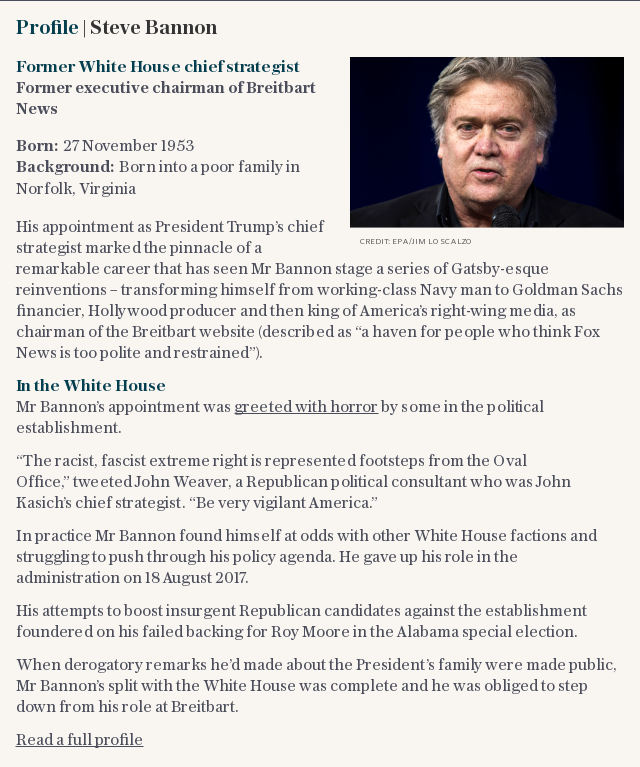Steve Bannon out as chief White House strategist 'by mutual agreement'

Steve Bannon has left his role as President Donald Trump's chief strategist, as the president tries to assuage the outrage sparked by his remarks about Charlottesville.
The White House issued a statement saying the departure was "by mutual agreement".
Mr Bannon, who ran the hard-Right news outlet Breitbart, ended his White House role on Friday afternoon.
He said he resigned, but sources close to Mr Trump said he was "given the option to resign" - another way of saying he was fired.
The decision was reportedly made after pressure from John Kelly, Mr Trump's new chief of staff, who was brought in to establish some sense of order in a chaotic, dysfunctional White House.
Mr Bannon, 63, has taken immense pride at his status at the head of the anti-establishment, flame-throwing wing of the White House. He was seen as connecting Mr Trump to his electoral base, and encouraged nationalist, "America First" policies.

He was often at odds with the "globalist" wing of the White House - Jared Kushner, Mr Trump's son-in-law; his wife Ivanka; H.R. McMaster, the head of the national security council; and Gary Cohn, director of the national economic council.
Mr Trump was reported earlier this week to have not spoken face-to-face with Mr Bannon in over a week.
On Tuesday he could only offer a lukewarm endorsement, responding to a question about Mr Bannon's future with: "We'll see."

Yet Mr Bannon wielded immense behind-the-scenes power inside the White House.
Saturday Night Live depicted him as the grim reaper, playing Mr Trump like a puppet - something that reportedly amused Mr Bannon, but enraged his boss.
And he was controversial from the start.
Appointed in August 2016, along with Kellyanne Conway, to manage the campaign, he was described as "the most dangerous political operative in America".
But Mr Trump appreciated his hardline views.
He was reportedly instrumental in the Mexican border wall policy, and pushed Mr Trump to take a strong line on policing. He was determined to even what he saw as an unequal playing field on trade, and China was a particular target of his anger.
He also reportedly urged Mr Trump not to criticise too strongly white nationalists, who Mr Bannon saw as a small but important part of Mr Trump's base.
Mr Trump's defence of white supremacists on Tuesday caused the most significant political damage to his presidency so far.
The following day Mr Bannon perhaps sealed his own fate by telephoning a reporter with The American Prospect, a Left-wing publication, to contradict his boss - and suggest that he was deciding who was in and who was out in the state department.
“There’s no military solution [to North Korea’s nuclear threats], forget it,” said Mr Bannon, directly undermining Mr Trump's vow to respond if attacked.
“Until somebody solves the part of the equation that shows me that ten million people in Seoul don’t die in the first 30 minutes from conventional weapons, I don’t know what you’re talking about, there’s no military solution here, they got us.”
Asked about his rivals at the departments of state, defence and treasury, who wanted to keep China on side by avoiding trade wars, Mr Bannon was unrepentant.
“They’re wetting themselves,” he said. “I’m changing out people at East Asian Defense; I’m getting hawks in.”

 Yahoo News
Yahoo News 
